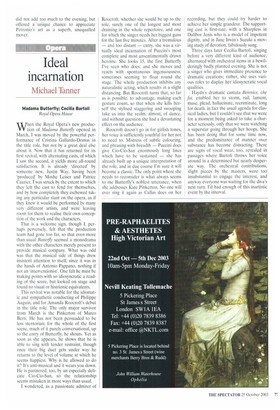Ideal incarnation
Michael Tanner
Madama Butterfly; Cecilia Bartoli Royal Opera House
When the Royal Opera's new production of Madarna Butterfly opened in March, I was moved by the powerful performance of Cristina Gallardo-Domas in the title role, but not by a great deal else about it. Now that it has returned for its first revival, with alternating casts, of which I saw the second, it yields more all-round satisfaction. It is already 'directed' by someone new, Justin Way, having been 'produced' by Moshe Leiser and Patrice Caurier. I was struck by the extent to which they left the cast to fend for themselves, and by how completely they eschewed taking any particular slant on the opera, as if they knew it would be performed by many very different artists, and were leaving room for them to realise their own conception of the work and the characters.
That is a welcome sign, though I, perhaps perversely, felt that the production team had gone too far, so that even more than usual Butterfly seemed a monodrama with the other characters merely present to provide musical company. What was odd was that the musical side of things drew insistent attention to itself, since it was in the hands of Antonio Pappano, nothing if not an 'interventionist'. One felt he must be making points with so idiosyncratic a reading of the score, but looked on stage and found no visual or histrionic equivalents.
This revival was notable for the idiomatic and sympathetic conducting of Philippe Auguin, and for Amanda Roocroft's debut in the title role. The only major survivor from March is the Pinkerton of Marco Berti. He has not been persuaded to be less stentorian: for the whole of the first scene, much of it purely conversational, up to the entry of Butterfly, he shouts. Yet as soon as she appears, he shows that he is able to sing with tender restraint, though once their big duet gets under way he returns to the level of volume at which he seems happiest. Why is he allowed to do it? It's anti-musical and it wears you down. He is partnered, too, by an especially delicate Cio-Cio-San, so the relationship seems mistaken in more ways than usual.
I wondered, as a passionate admirer of Roocroft. whether she would be up to the role, surely one of the longest and most draining in the whole repertoire, and one for which the singer needs her biggest guns for the last five minutes. After a tremulous — and too distant — entry, she was a virtually ideal incarnation of Puccini's most complete and most unsentimentally drawn heroine. She looks 15, the first Butterfly I've seen who does: and she moves and reacts with spontaneous ingenuousness, sometimes seeming to float round the stage. The whole production inhibits any naturalistic acting, which results in a slight distancing. But Roocroft turns that, so far as is possible, to advantage, making each gesture count, so that when she kills herself the stylised staggering and swooping take us into the realm, almost, of dance, and without question she had a devastating effect on the audience.
Roocroft doesn't go in for girlish tones, her voice is sufficiently youthful for her not to need to. Mistress of subtle colouring, and phrasing with breadth — Puccini does give Cio-Cio-San enormously long lines which have to be sustained — she has already built up a unique interpretation of the role, and in due course I'm sure it will become a classic. The only point where she needs to reconsider is what always seems to me Butterfly's noblest utterance, when she addresses Kate Pinkerton, No one will ever sing it again as Callas does on her recording, but they could try harder to achieve her simple grandeur. The supporting cast is first-rate, with a Sharpless in Dalibor Jenis who is a model of impotent dignity, and in Jane Irwin's Suzuki a moving study of devotion, fabulously sung.
Three days later Cecilia Bartoli, singing before a very different kind of audience, alternated with orchestral items in a bewilderingly badly planned evening. She is not a singer who gives immediate presence to dramatic creations; rather, she uses various roles to display her idiosyncratic vocal qualities.
Haydn's dramatic cantata Berenice, che fai, enabled her to storm, rail, lament, muse, plead, hallucinate, recriminate, long for death, in fact the usual agenda for classical ladies, but I couldn't see that we were for a moment being asked to take a character seriously, only that we were watching a superstar going through her hoops. She has been doing that for some time now, and the predominance of manner over substance has become distracting. There are signs of vocal wear, too, revealed in passages where Bartoli throws her voice around in a determined but nearly desperate way. The orchestral contributions, slight pieces by the masters, were too insubstantial to engage the interest, and anyway everyone was waiting for the diva's next turn, I'd had enough of this inartistic event by the interval.


































































































 Previous page
Previous page